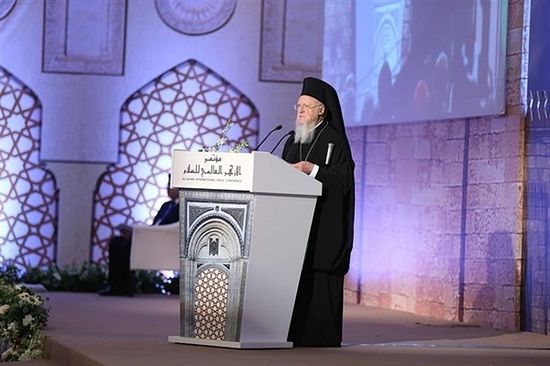
ECUMENICAL PATRIARCH: “TERRORISM IS A STRANGER TO ANY RELIGION”

Pravoslavie.ru – 28/4/17
On Wednesday, April 26, His All-Holiness Ecumenical Patriarch Bartholomew left Geneva, where he had addressed the World Council of Churches the day before, for Cairo, where he attended and addressed an interreligious conference at Al-Azhar University on Thursday. His address, “Religions and Peace,” focused on the importance of religions and interreligious dialogue in today’s world, and his view of the equally peaceful nature of all religions.
The international peace conference was attended by representatives of the religious, political, and academic spheres from various states, Romfea reports. Conscious of his inter-religious audience, His Holiness speaks throughout of “religion” in general, rather than the particularities of Orthodox Christianity and union with Jesus Christ.
The patriarch opened by noting the increase in terrorist attacks over the past two decades, which have left countless dead and injured, “and which are becoming the greatest threat and source of fear for contemporary societies,” and which are typically blamed on religion. He also highlighted the simultaneous willingness for peace-promoting dialogue among political, religious, and secular leaders.
“How, then,” Patriarch Bartholomew wonders, “after so many conferences, declarations and initiatives for peace, could we witness an increase of violence, instead of noticing a progress in peace making?”
To understand our modern world, he pinpointed four areas in which, not simply Orthodoxy in particular, but religion in general plays a critical role: Religion is connected with the deep concerns of the human being, providing answers to existential questions and opening eternity to man; Religion is related to the identity of peoples and civilizations; Religion has created and preserved man’s greatest cultural achievements, moral values, compassion, and respect for all of creation; and Religion is a vital factor in the peace process.
His All-Holiness did note that religion can cause divisive intolerance and violence, but, speaking of all religions equally, added, “this is rather [religion’s] failure, not its essence, which is the protection of human dignity.”
In his explanation, the extremes of relativism and fundamentalism distort and prevent these essential roles of religion in the modern world, noting that fundamentalism provides skeptics with arguments against faith. Relativism “denies the existence of truth,” while in his presentation, fundamentalism is that which “considers that its own truth is unique, and must therefore be imposed over the others.”
The patriarch recalls the recent terrorist attacks in Paris, Brussels, Istanbul, Saint Petersburg or Stockholm, and the most recent against Coptic churches in Tanta and Alexandria. Of course, all of these attacks were carried out by Muslims and in the name of Islam, although this point does not appear in the patriarch’s speech. Describing all religions as having the same ideals, he states, “The truth is that violence is the negation of the fundamental religious beliefs and doctrine.”
Romfea notes that His All-Holiness received a round of applause from the audience gathered in heavily-Islamic Egypt when he affirmed, “We would like to oppose at least one prejudice: Islam does not equal terrorism, because terrorism is a stranger to any religion.” He also noted that the encyclical of last year’s Cretan Council also emphasizes that fundamentalism does not “belong to the essence of the phenomenon of religion.”
The Constantinopolitan prelate offered the counter-example of the Mediterranean region, which he characterized as a place of peaceful cohabitation of Jews, Christians, and Muslims over the past several centuries, where people of various religions living together find “the most fundamental message for humanity which unites.”
Drawing to a close, he called upon all nations, states, and religions to work together to overcome the violence that we see so often in our world today, as with the various Islamic attacks he had previously referenced. “We need one another; we need common mobilization, common efforts, common goals, common spirit… Our future is common, and the way toward this future is a common journey,” he stated.
In conclusion, the patriarch addressed the inter-religious gathering, with the same words of the Psalmist with which he had opened his presentation to the World Council of Churches: Behold now, what is so good or so pleasant as for brothers to dwell together in unity? (Psalm 133:1).

491224 253235We stumbled more than here coming from a different web page and thought I may well check issues out. I like what I see so now im following you. Appear forward to exploring your internet page but again. 562989